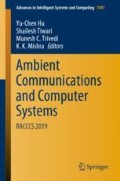Abstract
Social media along with different web forums contribute to a huge amount of data, i.e. opinions, feedbacks, reviews generated on a daily basis. Sentiment analysis is the identification of polarity (positive, negative or neutral) of the data to analyse the opinion of users on various platforms on a range of topics including those that have real business value, i.e. polarity of users on a product. With the advent of platforms like Twitter, people freely express their opinion on almost everything and that generates a huge amount of data which cannot be processed or analysed manually; therefore, we have various NLP and machine learning techniques which can effectively analyse and predict the polarity of the data which enables us to capture the sentiment of the people regarding a particular issue. In this paper, we intend to analyse the different machine learning algorithms for sentiment analysis of Twitter data and compare the algorithms’ performance on different datasets with the help of metrics like precision, accuracy, F-measure and recall.
Access this chapter
Tax calculation will be finalised at checkout
Purchases are for personal use only
References
Dr. Samam K.P., S.N. Vinithra, and Dr. M. Anand Kumar. 2015. Analysis of sentiment classification for hindi movie reviews: a comparison of different classifiers. International Journal of Applied Engineering Research, 10 (17) (Research India Publications).
Dhanya, N.M., and U.C. Harish. 2018. Sentiment analysis of twitter data on demonitization techniques, computer vision and biomechanics. Netherlands: Springer.
Asghar, Muhammad Zubair, Aurangzeb Khan, Shakeel Ahmad, and Fazal Masud Kundi1. (2014). A review of feature extraction in sentiment analysis. Journal of Basic and Applied Scientific Research.
Avanco, Lucas Vinicius, and Maria das Gras Volpe Nunes. 2014. Lexicon based sentiment analysis for review of products in Brazilian-Portugese. In Brazilian Conference on Intelligent Systems, Oct 2014.
Keith Stuart, Ana Botella, and Imma Ferr. 2016. A corpus driven approach to analysis of patient naratives. In 8th International Conference on Corpus Linguistics, vol. 1, 381–395, CILC 2016.
Hsu, Raymond, Bozhi See, and Alan Wu. 2010. Machine learning for sentiment analysis on the experience project. http://cs229.stanford.edu/proj2010/HsuSeeWuMachineLearningForSentimentAnalysis.pdf.
Ali Hasan, Sana Moin, Ahmad Karim and Shahaboddin Shamshirband, 2018. Machine learning based sentiment analysis for twitter accounts. Mathematical and Computational Applications.
Singh, Rashija, and Vikas Goel. 2019. Various machine learning algorithms for twitter sentiment analysis. Information and Communication Technology for Competitive Strategies, 763–772.
Wang, Yili, KyungTae Kim, ByungJun Lee, and Hee Yong Youn. 2018. Word clustering based on POS feature for efficient twitter sentiment analysis. Human-Centric Computing and Information Sciences, 8 (1): 17.
Ganesh, B.R., Deepa Gupta, and T. Saikala. 2017. Grammar error detection tool for medical transcription using stop words—POS tags ngram based model. In International Conference on Computational Intelligence and Informatics (ICCI), Hyderabad, Sept 2017.
https://web.stanford.edu/class/cs124/lec/Maximum_Entropy_Classifiers.pdf.
Author information
Authors and Affiliations
Corresponding author
Editor information
Editors and Affiliations
Rights and permissions
Copyright information
© 2020 Springer Nature Singapore Pte Ltd.
About this paper
Cite this paper
Yadlapalli, S.S., Rakesh Reddy, R., Sasikala, T. (2020). Advanced Twitter Sentiment Analysis Using Supervised Techniques and Minimalistic Features. In: Hu, YC., Tiwari, S., Trivedi, M., Mishra, K. (eds) Ambient Communications and Computer Systems. Advances in Intelligent Systems and Computing, vol 1097. Springer, Singapore. https://doi.org/10.1007/978-981-15-1518-7_8
Download citation
DOI: https://doi.org/10.1007/978-981-15-1518-7_8
Published:
Publisher Name: Springer, Singapore
Print ISBN: 978-981-15-1517-0
Online ISBN: 978-981-15-1518-7
eBook Packages: Intelligent Technologies and RoboticsIntelligent Technologies and Robotics (R0)

